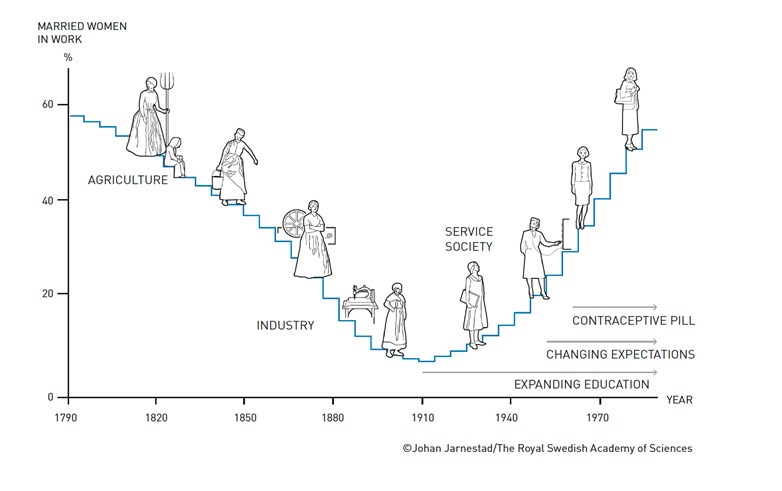Nobel prize highlights the drivers between the gender wage gap
The Royal Swedish Academy of Sciences has decided to award the Sveriges Riksbank Prize in Economic Sciences in Memory of Alfred Nobel 2023 to Claudia Goldin, Harvard University, “for having advanced our understanding of women’s labour market outcomes”.
Goldin's research uncovers the nuanced and evolving nature of the gender wage gap, demonstrating how it has changed in response to shifts in society, technological advancements, and market dynamics. Rather than seeing the wage gap as a static problem, Goldin's work shows its multifaceted dimensions and the diverse challenges women encounter in the workforce.
Despite significant advancements in many developed nations, the pay gap remains a persistent issue, even in wealthier countries. Goldin’s research delves deep into the root causes of this disparity.
SSE Professor Per Strömberg, a former member the Nobel selection committee, says:
"Even in Sweden, we see lower participation and wages for women, and in other countries, the differences are even starker." Goldin’s analysis sheds light on various factors, from societal norms and education opportunities to family planning and workplace structures, that contribute to this enduring gap. Her in-depth exploration into the historical and current intricacies of women's roles in the labor market offers richer nations a blueprint for understanding and addressing these disparities.
On the relevance of Goldin’s work, Strömberg comments: "It's perhaps easier than usual to explain its importance. Even if you’re not interested in equality, from an economic viewpoint it's inefficient not to utilize the full labor force."
"A pioneer"
"Goldin is the pioneer in understanding women’s role in the labor market," Strömberg says. What sets her research apart is her innovative approach, combining historical data and economic analysis. "By training, she's as much an economic historian as an economist. Using historical data helps understand the drivers of women’s outcomes more clearly than merely looking at recent data."
Highlighting Goldin's unique contributions, Strömberg shared, "She extended the data back to the late 1700s, a feat a lot more impressive than it sounds. Labor market participation among women fluctuated, challenging the assumption that economic growth directly translates to more women working."
Goldin's findings, especially regarding "child penalties," have profound implications. Strömberg explained, "The structure of jobs and responsibilities of raising children disproportionately fall on women. Even a brief period away from the labor market can leave them permanently behind compared to when they left."
Goldin's influence on the field is undeniable and winning the Nobel Prize is raising the status of the important work she and other economists are doing on uncovering the key factors behind work and wage disparity. "Everyone in that field owes a great debt to Goldin," Strömberg affirmed.




